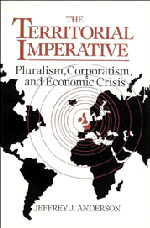Book contents
- Frontmatter
- Contents
- List of figures
- List of tables
- Preface
- 1 Introduction
- 2 Power-dependence and regional economic crisis
- 3 Central governments and regional policy
- 4 The British regions
- 5 The German Länder
- 6 The territorial imperative: Political logic interprets problem logic
- List of abbreviations
- Bibliography
- Index
1 - Introduction
Published online by Cambridge University Press: 26 March 2010
- Frontmatter
- Contents
- List of figures
- List of tables
- Preface
- 1 Introduction
- 2 Power-dependence and regional economic crisis
- 3 Central governments and regional policy
- 4 The British regions
- 5 The German Länder
- 6 The territorial imperative: Political logic interprets problem logic
- List of abbreviations
- Bibliography
- Index
Summary
Milan and the Mezzogiorno, Paris and Pontivy, London and Liverpool: Throughout the postwar era of relative affluence, most West European states have encompassed two nations, one prosperous, the other poor. Resilient territorial economic divides hardened while political processes across the continent grew decidedly national in scale with the rise of the interventionist state, the appearance of catchall political parties competing in a nationwide electoral marketplace, the emergence of powerful functional interest groups, and the decline of parliaments. And they persisted in the face of a selective retreat by central governments from broad areas of economic and social policy-making in the 1980s.
Declining regional economies generate highly complex political conflicts involving myriad actors across multiple levels of the polity. At the subnational level, political and economic actors in both the public and private sectors must determine whether to articulate territorial economic demands, to mobilize indigenous political and economic resources, and to develop strategies for adjusting to changing market conditions and for securing aid from central government. At the national level, policymakers in various parts of the state bureaucracy confront the political and economic strains generated by uneven economic development, and face a choice of their own: whether and how to respond to demands for assistance. Connecting the center and the provinces are institutions, like central government field administration, political parties, and vertical interest group associations, that structure the resolution of regional economic conflicts. The present volume explores these various manifestations of the territorial imperative.
Both theoretical and substantive considerations recommend a study of the politics of regional decline.
- Type
- Chapter
- Information
- The Territorial ImperativePluralism, Corporatism and Economic Crisis, pp. 1 - 21Publisher: Cambridge University PressPrint publication year: 1992



